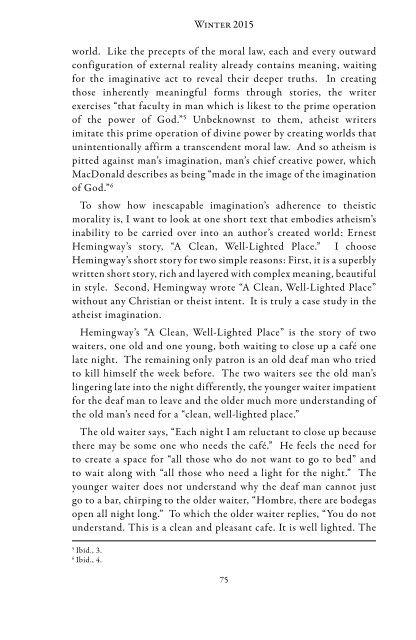THE CITY
h6c7p5d
h6c7p5d
You also want an ePaper? Increase the reach of your titles
YUMPU automatically turns print PDFs into web optimized ePapers that Google loves.
world. Like the precepts of the moral law, each and every outward<br />
configuration of external reality already contains meaning, waiting<br />
for the imaginative act to reveal their deeper truths. In creating<br />
those inherently meaningful forms through stories, the writer<br />
exercises “that faculty in man which is likest to the prime operation<br />
of the power of God.” 5 Unbeknownst to them, atheist writers<br />
imitate this prime operation of divine power by creating worlds that<br />
unintentionally affirm a transcendent moral law. And so atheism is<br />
pitted against man’s imagination, man’s chief creative power, which<br />
MacDonald describes as being “made in the image of the imagination<br />
of God.” 6<br />
To show how inescapable imagination’s adherence to theistic<br />
morality is, I want to look at one short text that embodies atheism’s<br />
inability to be carried over into an author’s created world: Ernest<br />
Hemingway’s story, “A Clean, Well-Lighted Place.” I choose<br />
Hemingway’s short story for two simple reasons: First, it is a superbly<br />
written short story, rich and layered with complex meaning, beautiful<br />
in style. Second, Hemingway wrote “A Clean, Well-Lighted Place”<br />
without any Christian or theist intent. It is truly a case study in the<br />
atheist imagination.<br />
Hemingway’s “A Clean, Well-Lighted Place” is the story of two<br />
waiters, one old and one young, both waiting to close up a café one<br />
late night. The remaining only patron is an old deaf man who tried<br />
to kill himself the week before. The two waiters see the old man’s<br />
lingering late into the night differently, the younger waiter impatient<br />
for the deaf man to leave and the older much more understanding of<br />
the old man’s need for a “clean, well-lighted place.”<br />
The old waiter says, “Each night I am reluctant to close up because<br />
there may be some one who needs the café.” He feels the need for<br />
to create a space for “all those who do not want to go to bed” and<br />
to wait along with “all those who need a light for the night.” The<br />
younger waiter does not understand why the deaf man cannot just<br />
go to a bar, chirping to the older waiter, “Hombre, there are bodegas<br />
open all night long.” To which the older waiter replies, “You do not<br />
understand. This is a clean and pleasant cafe. It is well lighted. The<br />
5<br />
Ibid., 3.<br />
6<br />
Ibid., 4.<br />
Winter 2015<br />
75


